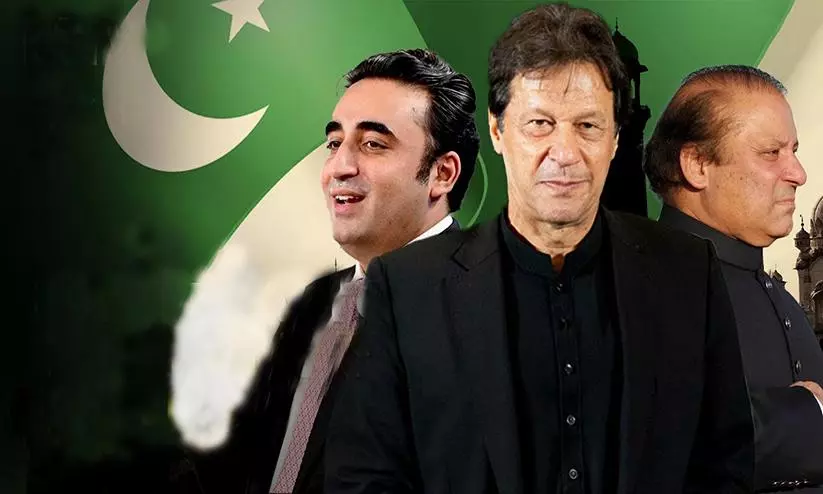
Pakistan's political drama amid looming challenges
text_fieldsFebruary 2024’s election was indecisive, with both the Pakistan Muslim League (PML) and the Pakistan Tehreek-e-Insaf (PTI) claiming victory. As always, claims and counterclaims of widespread cheating in the election followed.
The leader of PTI, Imran Khan, is currently serving a long prison sentence for revealing state secrets during his tenure as prime minister.
The Pakistan People’s Party (PPP) and the PML used to be bitter enemies. However, in the last election, the PPP supported the PML’s Shehbaz Sharif for the position of Prime Minister of Pakistan. In 2024, Bilawal Bhutto publicly stated that the PML won the election and that the PPP believed Shehbaz Sharif should and would be the next prime minister. Shehbaz Sharif is the younger brother of Mian Mohammad Nawaz Sharif, who has controlled the PML for over 30 years. The Sharifs are an extremely affluent Punjabi business family.
Perhaps cooperation between the PPP and PML is becoming the new normal.
Bilawal Bhutto is the third generation and the fourth dynasty of the Bhutto family to lead the PPP. His maternal grandfather, Zulifqar Ali Bhutto, founded the PPP. After Z.A. Bhutto was overthrown by the military and later hanged, the leadership of the PPP passed to the founder’s daughter, Benazir Bhutto. After her assassination, her widower, Asif Zardari, led the party and became its president. After Zardari stepped aside, his son Bilawal took over the leadership of the PPP. Bilawal uses his mother’s surname as his middle name and his father’s as his last name.
The Bhuttos are part of the 15% of Pakistanis who are Shia Muslims. They are also Sindhi. Only about 20% of Pakistanis are Sindhi, and most Sindhis vote for the PPP, even if they are Sunni. Nevertheless, the PPP appeals to some who are neither Sindhi nor Shia.
Although the PPP pays lip service to leftism, there is no genuinely socialist party in Pakistan with a significant presence. Generally, no one espouses secularism.
It is still uncertain who will be appointed Prime Minister of Pakistan, although Shehbaz Sharif has been the preferred candidate. The Prime Minister is appointed by the President. To complicate matters further, the current president is a member of the Tehreek-e-Insaaf (Movement for Justice).
Tehreek-e-Insaaf’s positions on issues bear similarities to those of Pakistan Jamaat e Islaami. JI openly supported the Taliban’s attacks on NATO forces in Afghanistan while NATO was on a United Nations mission to uphold the democratic government of Afghanistan.
The Pakistani Armed Forces warned the squabbling politicians to stop and sort things out. The army has launched coup d’états before, in 1951, 1977, and 1999. Even during a military regime, such as that of Ayub Khan in 1969, he was pushed aside by another general named Yahya Khan, arguably in a coup d’état.
Pakistan's dysfunctionality has led to a caretaker prime minister since August 14, 2023, ironically appointed on Pakistan's Independence Day.
Pakistan faces numerous alarming problems.
There is a population explosion, and the economy cannot grow fast enough to produce enough jobs.
Air quality is among the worst in the world. The country imports almost all its energy and is therefore at the mercy of world energy markets. Pakistan has enormous potential for renewable energy but is not tapping into it.
A conflict between the West and Iran is not unlikely, and as Iran borders Pakistan, there is a serious possibility of this conflict affecting Pakistan.
China is Pakistan’s major trade partner. As China’s economy is slowing down, this is bound to impact Pakistan.
As India’s economy progresses, Pakistan lags far behind. Pakistan cannot afford to upgrade its military to keep up with India’s armaments.
Karachi is the largest city in the world without a metro system, and its traffic congestion is severe. Sanitation and refuse collection in several cities are at a breaking point.
Violent crime rates are very high, and honour killings and sectarian strife are common. The police are notorious for their lassitude, corruption, brutality, and incompetence.
There is massive-scale speculation in the civil service and politics, and nepotism is rampant. In Pakistan, family connections are everything, and not always in a positive way.
The judiciary is sclerotic, partial, and untrusted. A routine case can take a decade, and someone who is evidently in the right cannot be sure of the outcome. Companies often sign contracts stipulating that any disputes will be adjudicated by foreign courts such as those in England or the Dubai International Financial Center.
The military and the ISI are the only functional branches of the state, but defalcation within them is not uncommon. They ensure they are paid high salaries and reside in luxurious cantonments. They are adept at conflating national security with self-interest.
The national debt is ballooning, inflation is eroding incomes, and Pakistan finds it almost impossible to borrow.
The Taliban has consolidated control in Afghanistan, and there is no indication that they will be ousted. Many Pakistanis welcome this, but others fear the Talibanization of Pakistan, posing a grave threat to the Khyber Pakhtunkhwa.
The author is a political analyst from the UK. The views expressed here are his personal.






















